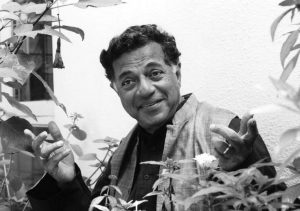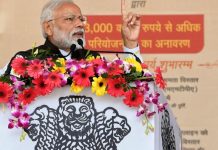 Noted playwright, actor and director Girish Karnad, a progressive voice that championed the freedom of expression, died at his residence in Bengaluru on June 10. He was 81. Karnad was ailing for some time now. A multifaceted personality, Karnad has acted in several plays and movies that have received critical acclamation.
Noted playwright, actor and director Girish Karnad, a progressive voice that championed the freedom of expression, died at his residence in Bengaluru on June 10. He was 81. Karnad was ailing for some time now. A multifaceted personality, Karnad has acted in several plays and movies that have received critical acclamation.
Karnad, a recipient of Jnanpith Award, was also conferred the Padma Shri in 1974 and the Padma Bhushan in 1992. He was also a Rhodes Scholar from Oxford University, in the 1960s that earned him his Master of Arts degree in philosophy, political science and economics.
His plays, written In Kannada have been translated into English and several Indian languages. He made his acting debut and screenwriting debut in iconic Kannada movie, Samskara (1970), based on a novel by UR Ananthamurthy. It was directed by Pattabhirarna Reddy and the film won the first President’s Golden Lotus Award for Kannada cinema. Though he started off his career in cinema as an actor, he is best known as a writer and thinker. Karnad was one of the most prominent artistic voices of his generation. He was an eminent playwright with works such as Nagmandala, Yayati and Tughlaq, which was one of the most successfully per-formed plays, to his credit.
He also worked in Hindi cinema’s parallel film movement in movies such as Swami, and Nishant. His TV credits include Malgudi Days in which he played Swami’s father and a hosting stint in the science magazine Tuning Point on Doordarshan in the early 1990s. In later years, Karnad was seen in commercial films such as Salman Khan’s Tiger Zinda Hai and Ajay Devgn-starrer Shivaay.
Girish Karnad was given a final farewell by close family members and friends at the Kallapalli crematorium in the city on June 10. The cremation was held amid tight security. Sources said that no rituals were performed before the body was sent into the electrical crematorium at 2 pm. Those mourning stayed for about an hour before leaving. No celebrities were present as the Karnad family wanted to keep it a simple affair.
Shanthinagar MLA and Bangalore Metropolitan Transport Corporation Chairman N A Haris paid his condolences before the cremation. Bengaluru Mayor Gangambike Mallikarjun, retired Additional Chief Secretary to Govt. of Karnataka Chiranjeevi Singh, Revenue minister RV Deshpande were present during the cremation.
D K Shivakumar told mediapersons that a funeral with state honours was planned for Karnad, but the family did not agree to it. When he attempted again to push for a guard of honour for Karnad, he was shown the way out by writer Ramachandra Guha, who was present with the family at the crematorium. The irrigation minister said that a state holiday was announced to give Karnad the honour he deserved.
At Karnad’s residence on Lavalle road, entry was restricted to just family, friends and members of the theatre fraternity. Poets Jayant Kaikini and K S Nissar, and theatre artiste-cum-writer Zafer Mohiuddin, who translated and staged Girish Karnad’s play Dreams of Tipu Sultan into Hindi and Urdu, visited Karnad’s house and paid their condolences. Arjun Sajnani, who is translating Karnad’s last play on the Vijayanagara empire, ‘Road to Talikota’ was also present. Zafer Mohiuddin, who had a long association with Karnad spanning 25 years, said that he was influenced by the legend in all aspects, even when it came to his dress sense.
Girish Karnad’s son journalist Raghu Karnad paints the picture of his “appa” as a man who was “gently bubbling with bits of history. legend. song folk-tale and philosophy.”
“That was the man I loved”, Raghu said in a moving Instagram post on June 13. Raghu said both he and his sister Shalmali Radha were at home in Bengaluru when Karnad passed away.
“As many friends have pointed out, he had an immaculate sense of timing. This past weekend, my sister and I were both at home for a friend’s wedding. On Saturday evening he completed a set of audio interviews with (translator-author) Arshia Sattar. On Sunday evening, the family sat together warmed by the long lines of sun on the terrace. I gave him his physio and my sister cut his nails. We talked about some new, difficult issues with his body. It was sad, but not only sad. On Monday morning he was gone”, he wrote.
Raghu said it was difficult to pen a tribute for Karnad, a multilingual multi-hyphenate personality. “… It’s felt like a tribute to Appa that the house and my mind have been swirling with languages: Konkani, Kannada, Tamil, Malayalam, English, Hindi, without much incomprehension.”
He said the family is thankful for all the love and gratitude that has poured in from people whose life Karnad touched. “Thank you for the many messages about how you felt enriched by his life and work. The reverse is also true. His life and work were enriched and elevated by gurus and professors, aunts and sisters, friends, collaborators, directors, students, publishers, actors, readers, rivals, aides, some very important drivers and many drinking companions. In his last few weeks and even hours I heard many of those names. Thank you all for building up the extraordinary person he was,” Raghu wrote.
letters@tehelka.com












